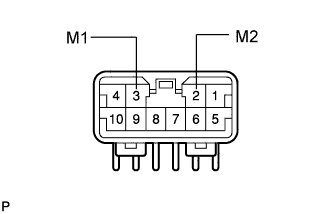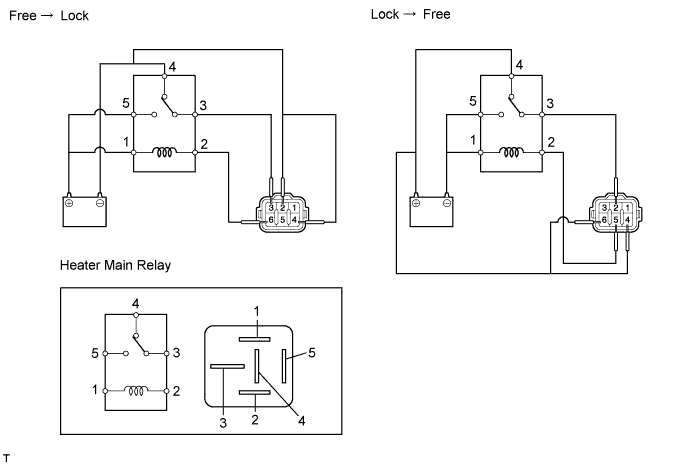Differential Lock System -- On-Vehicle Inspection |
| 1. CHECK DIFFERENTIAL LOCK SYSTEM |
 |
Check the indicator light.
Check that the indicator lights up for approx. 1 second when the ignition switch is turned ON.
Check the differential lock operation.
Jack up the vehicle and start the engine.
Shift the transfer shift lever to the L position.
When the differential lock control switch is set to the ON position, the indicator light turns on. Differential lock is applied to the rear wheel at this time.
- HINT:
- If the gears of the differential lock system are not meshed, the indicator light remains blinking. If necessary, rotate the tires to mesh the gears.
When the differential lock control switch is at the OFF position, the indicator light goes off. Differential lock is released for the rear wheel at this time.
Measure the voltage between the terminals of the four wheel drive control ECU when switching the differential control switch with the speedometer registering approx. 8 km/h (5 mph) or more.
- Standard voltage:
Switch Condition Tester Connection Specified value ON 3 (M1) - 2 (M2) 0.5 V or less (No change)
Return the differential lock control switch to OFF.
Stop the engine and lower the vehicle.

| 2. CHECK WIRE HARNESS |
 |
Check the system circuit with the connector disconnected.
Disconnect the F18 connector from the four wheel drive control ECU.
- Standard voltage:
Tester Connection Trouble Part Condition Specified Condition 3 (M1) - 2 (M2) Differential lock shift actuator - Below 100 Ω 7 (GND) - Body ground Body ground - Below 1 Ω 10 (SPD) - Body ground Speed sensor Vehicle moves slowly 1 pulse 40 cm (15.75 in.) 5 (IG) - Body ground Differential fuse Ignition switch ON 0 to 14 V 1 (RLP) - Body ground Rear differential lock indicator switch Ignition switch ON with indicator light ON About 0 V Ignition switch ON with indicator light OFF 0 to 14 V 8 (4WD) - Body ground L position switch Ignition switch ON with transfer shift lever not on L About 0 V Ignition switch ON with transfer shift lever on L 0 to 14 V 4 (R) - Body ground Differential lock control switch Ignition switch ON with differential lock control switch ON 0 to 14 V Ignition switch ON with differential lock control switch OFF About 0 V
Measure the resistance of the wire harness side connector.
- Standard resistance:
Tester Connection Trouble Part Condition Specified Condition 3 (M1) - 2 (M2) Differential lock shift actuator - Below 100 Ω 7 (GND) - Body ground Body ground - Below 1 Ω
Measure the voltage of the wire harness side connector.
- Standard voltage:
Tester Connection Trouble Part Condition Specified Condition 1 (RLP) - Body ground Rear differential lock indicator switch Ignition switch ON with indicator light ON About 0 V Ignition switch ON with indicator light OFF 0 to 14 V 8 (4WD) - Body ground L position switch Ignition switch ON with transfer shift lever not on L About 0 V Ignition switch ON with transfer shift lever on L 0 to 14 V 4 (R) - Body ground Differential lock control switch Ignition switch ON with differential lock control switch ON 0 to 14 V Ignition switch ON with differential lock control switch OFF About 0 V
- If the circuit is not as specified, check and repair or replace the trouble part shown in the table above.
| 3. CHECK FOUR WHEEL DRIVE CONTROL ECU |
 |
Check the system circuit with the connector connected.
Turn the ignition switch to the ON position.
Shift the transfer shift lever to the L position.
Measure the voltage when the control switch is in the position shown in the table.
- Standard voltage:
Tester Connection Switch Position Specified Condition 8 (4WD) - 7 (GND) - 0.5 V or less (RLP) - 7 (GND) ON* 0.5 V or less 3 (M1) - 2 (M2) OFF → ON 0.5 V or less → 10 to 14 V (approx. 1 sec.) →0.5 V or less 2 (M2) - 3 (M1) ON → OFF
- HINT:
- *: The rear differential should be locked mechanically.
- If the circuit is not as specified, replace the ECU.
| 4. CHECK DIFFERENTIAL LOCK SHIFT ACTUATOR |
Jack up the vehicle.
Use a heater relay (marking: HTR) and connect it, as shown below.
- NOTICE:
- Connect the terminals being careful not to touch the neighboring terminals or metallic parts of the relay housing.
Rotate the tire and check that the actuator changes from free to lock and lock to free.

- If the operation is not as specified, replace the actuator.
- If the operation is not as specified, replace the actuator.